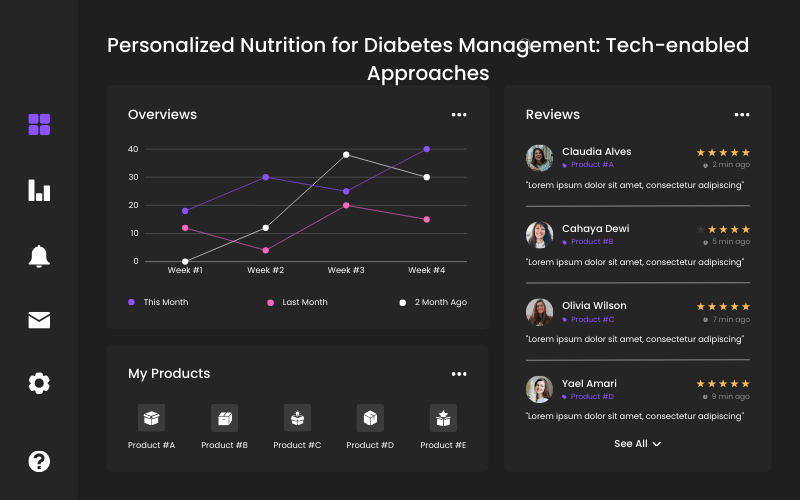Leveraging Mobile Apps for Diabetes Education and Support

Many people inquire, "Do they use a diabetes app to track their stats?" And they consistently respond in the affirmative. According to their experience, if an individual with diabetes requires effective dietary guidance, health monitoring, and medication advice, mobile health applications prove to be an excellent choice.
These applications encompass a broad spectrum of functions, from monitoring exercise and food intake to facilitating information sharing and peer support. However, the utility of these apps depends on factors such as the specific app in use, its available features, and associated costs.
In the following discussion, the focus shifts to diabetes-friendly applications and how they can help maintain one's condition. The individual also shares a few apps they have personally used, ones that boast user-friendly interfaces and quick adaptability. So, let's delve into the subject.
Do diabetes apps provide assistance?
Mobile health apps are instrumental in helping individuals achieve their diabetes management goals. These apps furnish user-friendly platforms that eliminate the uncertainty surrounding various tasks, such as blood sugar control and dietary tracking. They prove invaluable for both diabetes management and prevention.
These applications can be utilized for:
- Medication tracking
- Weight monitoring
- Insulin management
- Dietary planning
- Tracking blood glucose trends and patterns
- Formulating exercise plans
- Stress level management
- Sleep monitoring
Recent studies indicate that the latest diabetes apps primarily focus on monitoring glucose levels and encouraging lifestyle modifications. They empower individuals to self-care and remain motivated to adhere to their medication regimens.
These apps come equipped with distinctive features that store and highlight critical blood sugar trends, patterns, and HbA1C values. This data allows the individual's pharmacist to oversee their treatment remotely when necessary.
Over time, experts anticipate that these apps will continue to evolve, benefitting from machine learning to become more adaptable and craft personalized treatment plans. This adaptability proves advantageous when monitoring physical activity, diet, and medication adherence.
Is regulation necessary for diabetes-friendly apps?
In the United States, the FDA assumes the role of regulating medications and medical devices, including certain medical mobile applications. While the FDA does regulate high-risk apps, such as those involved in insulin dosage calculations, it does not extend its oversight to low-risk apps providing diabetes support and health monitoring.
Digital therapeutics, or digiceuticals, are validated health technologies designed to treat medical or psychological conditions and enhance clinical outcomes. These apps require FDA approval akin to prescription medications.
Leveraging mobile apps for diabetes support and education
For those seeking to employ apps for diabetes management, understanding how the algorithms function is crucial. Following app installation, users typically complete a brief medical history survey. They specify the app's intended purpose and the issues they hope to address.
Users then select the most pertinent topics related to their diabetes. Subsequently, the app conducts a comprehensive analysis based on the survey responses and selected topics, assisting users in achieving their objectives.
For instance, if a user selects a dietary planning feature and adheres to a strict diet, the app can offer recommendations for calorie tracking, meal planning, and recipe suggestions. The app's database should encompass a variety of food products and their nutritional values, including sugar, carbohydrates, and calories.
One of the significant benefits of using these apps is the insightful data analysis they provide. Some apps generate reports that help users identify patterns, trends, and areas for improvement, which can be particularly useful when dealing with fluctuating blood sugar levels.
To maximize the app's utility, users should explore all of its features and functionalities, including educational resources like videos, articles, and interactive content. Additionally, many apps facilitate regular data logging and monitoring, and some even allow for the synchronization of glucose meters to enable automatic tracking. Users can set medication reminders, enhancing adherence to treatment regimens.
Physical activity tracking is another valuable feature offered by diabetes apps. They allow users to monitor their exercise routines, set goals, and track progress. Furthermore, these apps often provide opportunities to engage with online diabetes communities, enabling users to share experiences, seek advice, or offer support to others.
While mobile apps are valuable tools, users should not rely on them exclusively. They should continue to consult with their healthcare providers to discuss treatment decisions. When issues arise, sharing relevant data and insights obtained from these apps can help tailor treatment plans effectively.
Which mobile apps are suitable for managing diabetes?
The individual recommends several mobile health apps that they have found useful and effective for diabetes management.
For nutrition: Fooducate
Fooducate aids in the development of healthier eating habits by allowing users to search for various food products and scan their barcodes. It offers a vast food database, complete with calorie and macronutrient information. Even the free version of the app serves as a useful dietary journaling tool, with a standout feature being its nutritional value-based grading system for foods and beverages.
For lifestyle changes: BlueStar Diabetes
The BlueStar app provides various resources for daily support, including personalized coaching, educational materials about diabetes, and real-time chats with healthcare professionals. This FDA-cleared app adapts its messages and suggestions based on changing metrics and medications, regardless of whether the free or paid version is used. Users can share their data with healthcare providers for review and modification of treatment plans.
For blood sugar control: DiabTrend
DiabTrend is a valuable app for predicting blood sugar levels. Its AI technology learns about the user's unique glucose metabolism characteristics, providing personalized predictions for glucose levels. This feature helps users understand their blood sugar fluctuations and prevent issues like highs and lows.



